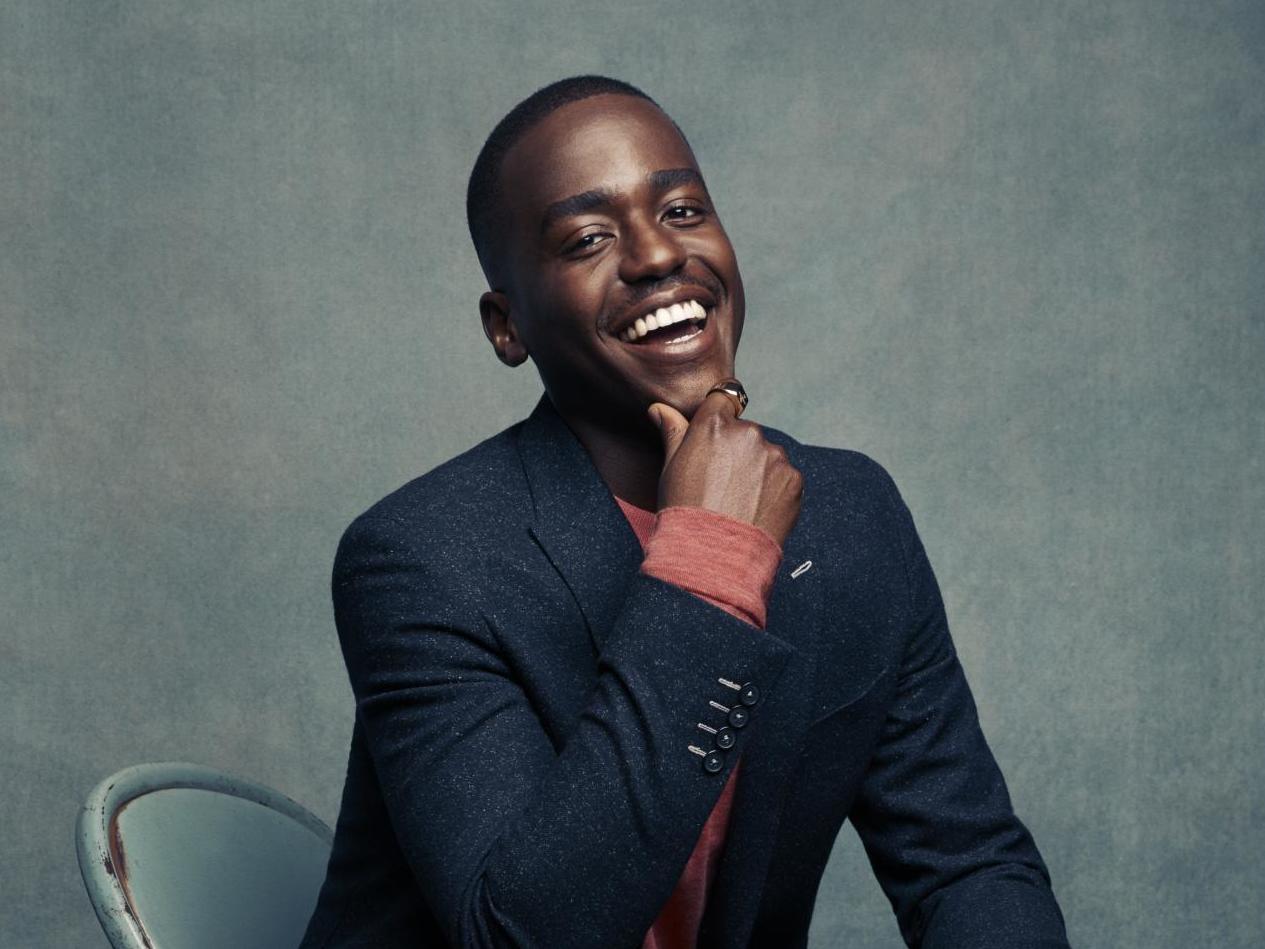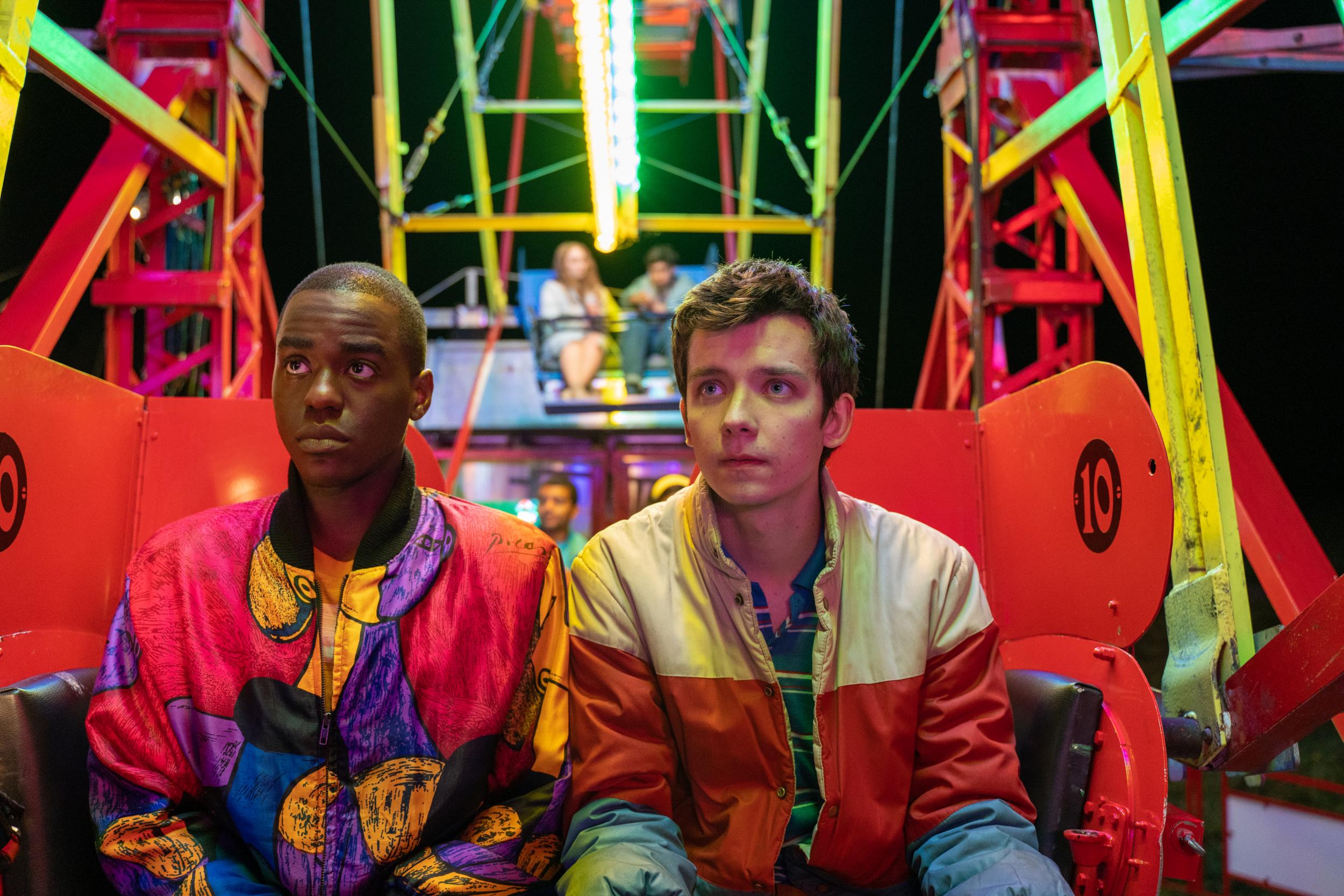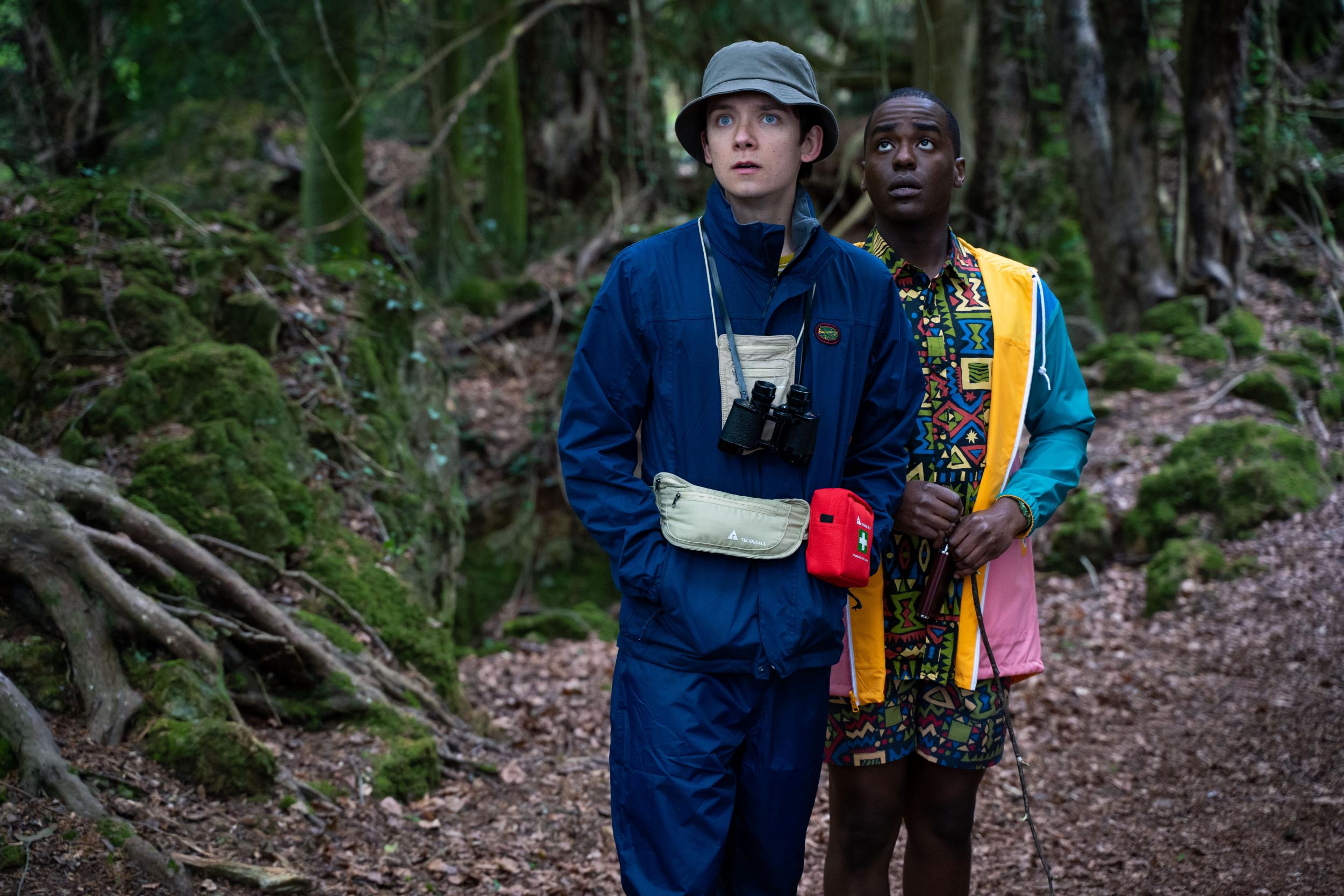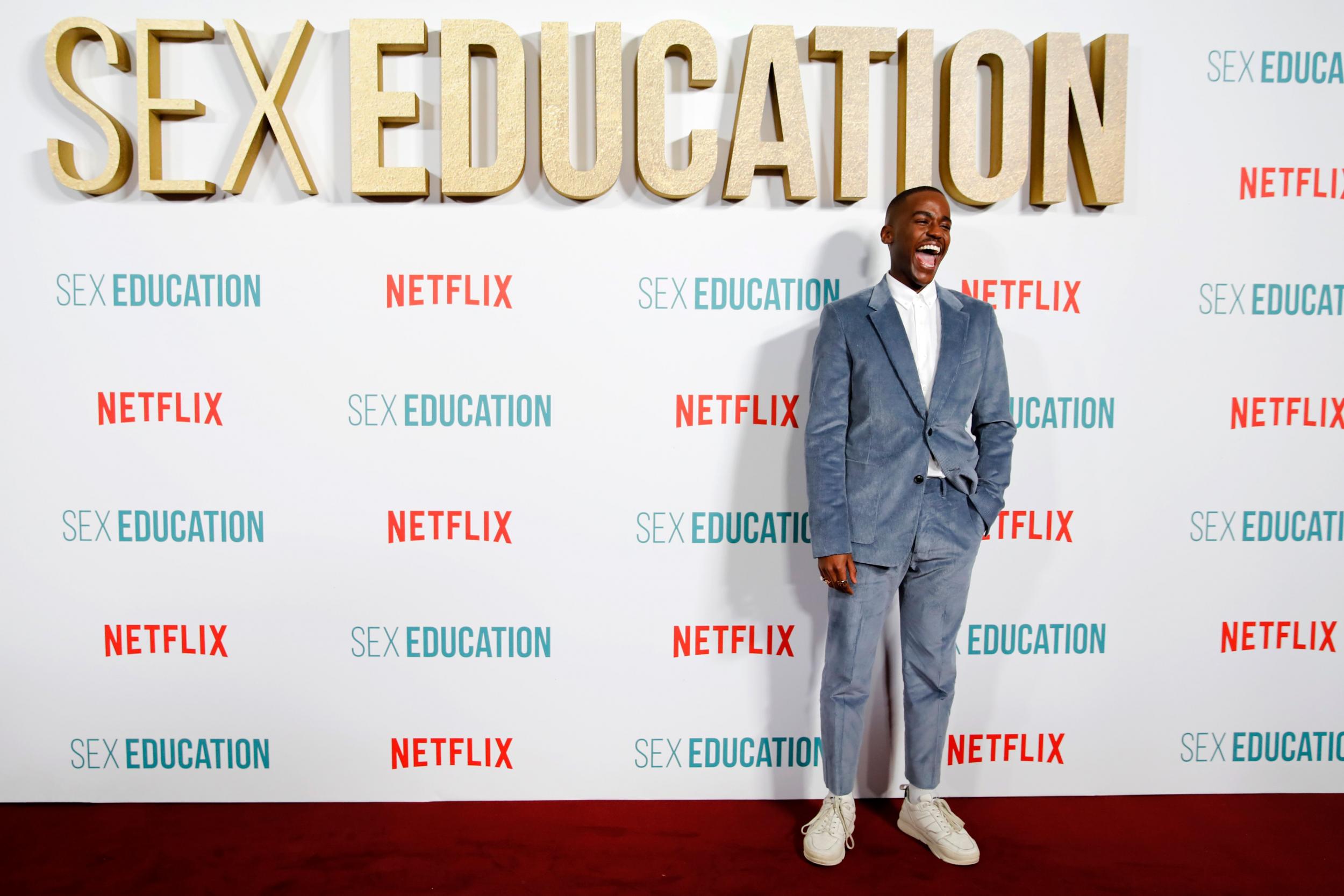Ncuti Gatwa: 'I've almost been beaten up for saying I'm Scottish'
The Scottish-Rwandan actor is one of the breakout stars of Netflix’s ‘Sex Education’. He tells Alexandra Pollard about playing a black, gay best friend devoid of stereotypes, growing up in working-class Scotland and why he has no time for organised religion


Ncuti Gatwa is a decade older than he’s supposed to be. Well, a decade older than Eric Effiong, the exuberant schoolkid he plays on Netflix’s Sex Education.
“One boy on set was born in the year 2000,” says the 27-year-old, a look of cartoonish horror on his face. “And I said, ‘This is absolutely disgusting. That is a disgusting age. And for us to be working alongside each other? Horrendous.’” He bursts into a cackle.
If you’ve seen Sex Education, you’ll know the laugh I’m talking about. It takes up his whole face, and fills up the whole room. In the show, it is usually deployed at the loving expense of Eric’s best friend Otis (Asa Butterfield) – a perennially embarrassed video-game enthusiast, who becomes the school’s reluctant (unsanctioned) sex therapist. Eric is the yin to Otis’s yang – confident and gregarious, where his pal is timid and filled with self-doubt. But make no mistake: he is not just the best friend.
“He’s a black best friend, and he’s a gay best friend,” says Gatwa. “Those are two things that get stereotyped all the time, and he’s both of them in one, and there was just a complete lack of stereotypes.” Sipping an earl grey tea that he finds disappointingly weak – “but it’s fine, we can work with it” – the Scottish-Rwandan actor is sitting in a London hotel room. He’s dressed a little less colourfully, though no less sharply, than Eric would – in a mustard yellow and brown striped top, box-fresh white trainers and glasses with rims barely bigger than his eyes.
“When we have gay characters on TV, they’re just, kind of, gay for the sake of being gay,” he continues. “That’s their personality. That’s their whole backstory, that’s their future story, that’s their present story – it’s just gay. Nobody’s just gay. People are people, and we all fall onto the spectrum. I liked that he had his own story, and his own journey, and his own beginning, middle and end.”
That end hasn’t come yet. The first series was so successful – Netflix even broke its own rules to boast about the 40 million people who binged Sex Education – that a second one was announced a month later. Before then, Gatwa’s biggest claim to fame had been as “male customer” in one episode of the short-lived BBC4 sitcom Bob Servant. “I hopped onto a plane with 500 Instagram followers,” he says of the day Sex Education was released. “Eight hours later, I hopped off the plane with a couple hundred thousand.”

He’s not used to the fame yet. “You get on the tube and you notice everyone’s looking at you, and you’re like, ‘What’s on my face?’ It always takes me a couple of seconds to remember I’m on a Netflix show that airs to the entire world.”
At least part of the reason for the show’s success was that it deftly destigmatised sex and sexuality – tackling puberty, consent, slut-shaming, abortion and porn with tact and no small amount of humour. And not just through the lens of straight, white people. “We’re challenging what people of colour can do,” says Gatwa, “what disabled actors can do, what non-binary means, what trans means, and that’s quite exciting.”
Eric, in particular, struck a chord when the show premiered in January last year – not just with those enamoured by his ebullience and killer wardrobe, but by people who had rarely, if ever, seen themselves on screen before. “People reach out every day,” says Gatwa, “telling me it’s illegal to be gay where they’re from, or their families don’t know and they’re struggling, or just that they watch the show for escapism. It’s very beautiful and it’s nice to know that people can find strength in our characters. Representation goes a long, long, long way.”

Watch Apple TV+ free for 7 day
New subscribers only. £9.99/mo. after free trial. Plan auto-renews until cancelled.
ADVERTISEMENT. If you sign up to this service we will earn commission. This revenue helps to fund journalism across The Independent.

Watch Apple TV+ free for 7 day
New subscribers only. £9.99/mo. after free trial. Plan auto-renews until cancelled.
ADVERTISEMENT. If you sign up to this service we will earn commission. This revenue helps to fund journalism across The Independent.
Unusually for a gay character, Eric is already out when we first meet him – to himself, his friends, his teachers and his traditional, west African parents. His dad (DeObia Oparei) struggles, in series one, when he experiments with drag – but he loves and respects his son. Without giving too much away, Eric’s arc in series two is no less affecting. There might even be a love triangle on the cards.
“It’s not the classic coming out story,” says Gatwa, who nimbly steers the conversation clear of his own sexuality. “It’s not him trying to figure out what his sexuality is – he knows it, and the school knows it, and his family knows it. It’s about him figuring out how he’s going to walk in a world that’s not always going to be nice to him.”

Gatwa has his own experience of that. When he and his family moved to Scotland from Rwanda during the 1994 genocide, they were one of “like three black families in the whole of Edinburgh”, he says. “I was quite an easy target in a state Scottish high school. I grew up in a working-class area, and I stood out – for my voice, my appearance, I did dance and things like that. But I always had faith in my charm. I always had faith in my charisma.”
He’s not deluded in that faith. Gatwa is breezy and loquacious, and could probably charm his earl grey into being stronger if he tried hard enough. Watch a video of him doing press with his co-stars and it’s clear they adore him. “I was like, ‘If I can go around each group and befriend them all, then I’m all powerful,” he recalls of his time at school. “Divide and conquer.” And did it work? “It did work! I was all powerful!”
At the weekends, Gatwa, whose father was a minister, would go to church. He was sent to bible study until the age of 15, “but my parents were very cool. When I got to 15, they were like, ‘If you can be bothered to get up on Sunday, then come along. If you can’t, don’t worry about it.’” Now, he says, “I have faith, but I’m not the biggest fan of organised religion. There’s a lot of hypocrites in church. A lot of hypocrites.”
When he left Edinburgh, Gatwa trained at the Royal Conservatoire of Scotland before moving to London. In England, his accent – to my ears a gentle mix of Scottish, west African and English – baffled people. “People have tried to fight me,” he says. “There’ve been times when I’ve been on a night out and people ask me where I’m from.” He acts out the kind of conversation that ensues.
“‘Oh I’m from Scotland.’
“‘Nah, no you’re not mate.’
“‘No, I am.’
“‘Where’s your accent then?’
“‘In my mouth.’
“‘Why are you taking the piss?’”
He laughs. “And then it turns into a big… The amount of times I’ve almost been beaten up for saying I’m Scottish. It’s given me an identity crisis.” But why does he think it makes people so angry? “People really cannot understand the concept of a black boy in a tracksuit in London being from Scotland. People think I’m taking the piss. I’m like, ‘Stop taking my Scottishness away. You don’t define me.’”

That kind of thing would surely bother even the hardiest of people – but Gatwa brushes it off. “Resilience has always been something I’ve seen and admired,” he shrugs. “I grew up with a single mum, an immigrant mum who couldn’t speak the language, no money, three kids on her back, coming from Rwanda, and she’s done a sterling job with all three of us. I saw her struggle, I saw her fight all the time. Every day was another fight, and she always fought tooth and nail for all three of us. She just seemed to get through whatever hardship came her way. I think that’s made me quite a resilient person. I look at my mum and I’m like, ‘If my mum can get through that, I can get through this.’”
It’s an outlook that comes in handy in the ruthless world of acting, too. He’s about to star alongside Shailene Woodley and Felicity Jones in The Last Letter from Your Lover, and after that, he’s the lead in an American film. “I don’t see rejection,” he says. “I don’t see doors slamming in my face. OK, I’m going to climb through the window!” He laughs. “I’m going to go through the garage door.”
Sex Education series two arrives on Netflix on Friday 17 January
Join our commenting forum
Join thought-provoking conversations, follow other Independent readers and see their replies
Comments
Bookmark popover
Removed from bookmarks